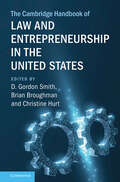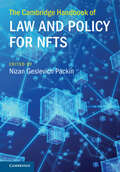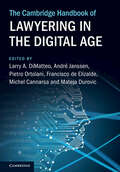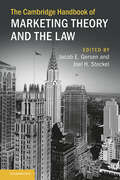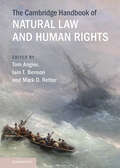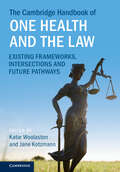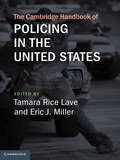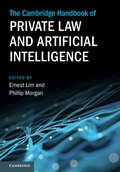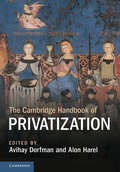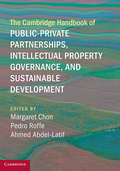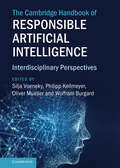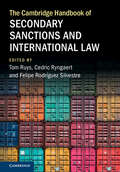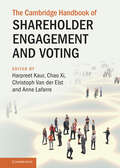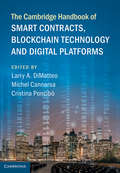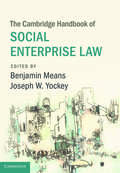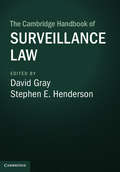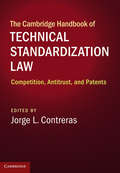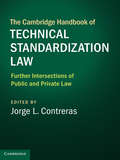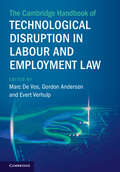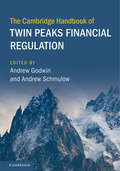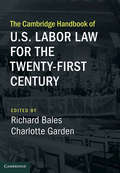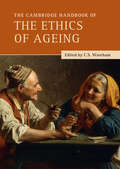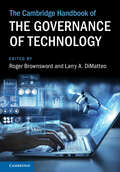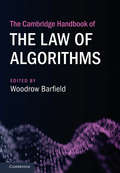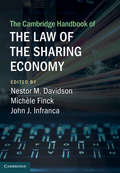- Table View
- List View
The Cambridge Handbook of Law and Entrepreneurship in the United States (Cambridge Law Handbooks)
by D. Gordon Smith Brian J. Broughman Christine HurtLaw plays a key role in determining the level of entrepreneurial action in society. Legal rules seek to define property rights, facilitate private ordering, and impose liability for legal wrongs, thereby attempting to establish conditions under which individuals may act. These rules also channel the development of technology, regulate information flows, and determine parameters of competition. Depending on their structure and implementation, legal rules can also discourage individuals from acting. It is thus crucial to determine which legal rules and institutions best enable entrepreneurs, whose core function is to challenge incumbency. This volume assembles legal experts from diverse fields to examine the role of law in facilitating or impeding entrepreneurial action. Contributors explore issues arising in current policy debates, including the incentive effect of legal rules on startup activity; the role of law in promoting or foreclosing market entry; and the effect of entrepreneurial action on legal doctrine.
The Cambridge Handbook of Law and Policy for NFTs (Cambridge Law Handbooks)
by Nizan Geslevich PackinAs blockchain in general and NFTs in particular reshape operation logistics, data creation, and data management, these technologies bring forth many legal and ethical dilemmas. This handbook offers a comprehensive exploration of the impact of these technologies in different industries and sectors including finance, anti-money laundering, taxation, campaign-finance, and more. The book specifically provides insights and potential solutions for cutting-edge issues related to intellectual property rights, data privacy and strategy, information management, and ethical blockchain use, while offering insights, case studies, and recommendations to help anyone seeking to shape effective, balanced regulation to foster innovation while safeguarding the interests of all stakeholders. This handbook offers readers an invaluable roadmap for navigating the dynamic and evolving landscape of these new technologies.
The Cambridge Handbook of Lawyering in the Digital Age (Cambridge Law Handbooks)
by André Janssen Mateja Durovic Larry A. DiMatteo Francisco De Elizalde Pietro Ortolani Michel CannarsaWith increasing digitalization and the evolution of artificial intelligence, the legal profession is on the verge of being transformed by automated technology (legal tech). This handbook examines these developments and the changing legal landscape by providing perspectives from multiple interested parties, including practitioners, academics, and legal tech companies from different legal systems. Scrutinizing the real implications posed by legal tech, the book advocates for an unbiased, cautious approach for the engagement of technology in legal practice. It also carefully addresses the core question of how to balance fears of industry takeover by technology with the potential for using legal tech to expand services and create value for clients. Together, chapters develop a framework for analyzing the costs and benefits of new technologies before implementing them into legal practice. This interdisciplinary collection features contributions from lawyers, social scientists, institutional officials, technologists, and current developers of e-law platforms and services.
The Cambridge Handbook of Marketing and the Law (Cambridge Law Handbooks)
by Jacob E. Gersen Joel H. SteckelThis handbook examines a wide range of current legal and policy issues at the intersection of marketing and the law. Focusing on legal outcomes that depend on measurements and interpretations of consumer and firm behavior, the chapters explore how consumers form preferences, perceptions, and beliefs, and how marketers influence them. Specific questions include the following: How should trademark litigation be valued and patent damages assessed? What are the challenges in doing so? What divides certain marketing claims between fact and fiction? Can a litigant establish secondary meaning without a survey? How can one extract evidence on consumer behavior with the explosion of social media? This unique volume at the intersection of marketing and the law brings together an international roster of scholars to answer these questions and more.
The Cambridge Handbook of Natural Law and Human Rights (Cambridge Law Handbooks)
by Tom Angier Iain T. Benson Mark D. RetterThis Handbook provides an intellectually rigorous and accessible overview of the relationship between natural law and human rights. It fills a crucial gap in the literature with leading scholarship on the importance of natural law as a philosophical foundation for human rights and its significance for contemporary debates. The themes covered include: the role of natural law thought in the history of human rights; human rights scepticism; the different notions of 'subjective right'; the various foundations for human rights within natural law ethics; the relationship between natural law and human rights in religious traditions; the idea of human dignity; the relation between human rights, political community and law; human rights interpretation; and tensions between human rights law and natural law ethics. This Handbook is an ideal introduction to natural law perspectives on human rights, while also offering a concise summary of scholarly developments in the field.
The Cambridge Handbook of One Health and the Law: Existing Frameworks, Intersections and Future Pathways (Cambridge Law Handbooks)
by Katie Woolaston Jane KotzmannThis handbook is essential for legal scholars, policymakers, animal and public health professionals, and environmental advocates who want to understand and implement the One Health framework in governance and law. It explores how One Health – an approach integrating human, animal, and environmental health – can address some of the most pressing global challenges, including zoonotic diseases, biodiversity loss, climate change, and antimicrobial resistance. Through detailed case studies, the book demonstrates how One Health is already embedded in legal and policy frameworks, evaluates its effectiveness, and offers practical guidance for improvement. It compares One Health with other interdisciplinary paradigms and existing legal frameworks, identifying valuable lessons and synergies. The book concludes by mapping a transformative path forward, showing how One Health can be used to fundamentally reshape legal systems and their relationship with health and sustainability. This is an invaluable resource for anyone seeking innovative, equitable, and sustainable solutions to global health challenges.
The Cambridge Handbook of Policing in the United States
by Tamara Rice Lave Eric J. MillerThe Cambridge Handbook of Policing in the United States provides a comprehensive collection of essays on police and policing, written by leading experts in political theory, sociology, criminology, economics, law, public health, and critical theory. It unveils a range of experiences - from the police chief of a major metropolitan force to ordinary people targeted for policing on the street - and asks important questions about whether and why we need the police, before analyzing the law of policing, police use of force, and police violence, paying particular attention to the issue of discrimination against marginalized and vulnerable communities at the blunt end of police interference. The book also discusses technological innovations and proposals for reform. Written in accessible language, this interdisciplinary work will be a valuable resource for anyone interested in understanding the present and future of policing in the United States.
The Cambridge Handbook of Private Law and Artificial Intelligence (Cambridge Law Handbooks)
by Ernest Lim Phillip MorganAI appears to disrupt key private law doctrines, and threatens to undermine some of the principal rights protected by private law. The social changes prompted by AI may also generate significant new challenges for private law. It is thus likely that AI will lead to new developments in private law. This Cambridge Handbook is the first dedicated treatment of the interface between AI and private law, and the challenges that AI poses for private law. This Handbook brings together a global team of private law experts and computer scientists to deal with this problem, and to examine the interface between private law and AI, which includes issues such as whether existing private law can address the challenges of AI and whether and how private law needs to be reformed to reduce the risks of AI while retaining its benefits.
The Cambridge Handbook of Privatization
by Avihay Dorfman Alon HarelSome goods and services seem to be fundamentally public, such as legislation, criminal punishment, and fighting wars. By contrast, other functions, such as garbage collection, do not. This volume brings together prominent scholars from a range of academic fields - including law, economics, philosophy, and sociology - to address the core question of what makes a certain good or service fundamentally public and why. Sometimes, governments and other public entities are superior because they are more likely to get at the right decisions or follow fair procedures. In other instances, the provision of goods and services by public entities is intrinsically valuable. By analyzing the these answers, the authors also explore the nature of the state and its authority. This handbook explores influential arguments for and against privatization and also develops a number of key studies explaining, justifying, or challenging the legitimacy and the desirability of public provision of particular goods and services.
The Cambridge Handbook of Public-Private Partnerships, Intellectual Property Governance, and Sustainable Development
by Pedro Roffe Margaret Chon Ahmed Abdel-LatifPublic-private partnerships (PPPs) play an increasingly prominent role in addressing global development challenges. United Nations agencies and other organizations are relying on PPPs to improve global health, facilitate access to scientific information, and encourage the diffusion of climate change technologies. For this reason, the 2030 Agenda for Sustainable Development highlights their centrality in the implementation of the Sustainable Development Goals (SDGs). At the same time, the intellectual property dimensions and implications of these efforts remain under-examined. Through selective case studies, this illuminating work contributes to a better understanding of the relationships between PPPs and intellectual property considered within a global knowledge governance framework, including innovation, capacity-building, technological learning, and diffusion. Linking the governance of intellectual property to the SDGs, this is the first book to chart the activities of PPPs at this important nexus.
The Cambridge Handbook of Responsible Artificial Intelligence: Interdisciplinary Perspectives (Cambridge Law Handbooks)
by Wolfram Burgard Silja Voeneky Philipp Kellmeyer Oliver MuellerIn the past decade, artificial intelligence (AI) has become a disruptive force around the world, offering enormous potential for innovation but also creating hazards and risks for individuals and the societies in which they live. This volume addresses the most pressing philosophical, ethical, legal, and societal challenges posed by AI. Contributors from different disciplines and sectors explore the foundational and normative aspects of responsible AI and provide a basis for a transdisciplinary approach to responsible AI. This work, which is designed to foster future discussions to develop proportional approaches to AI governance, will enable scholars, scientists, and other actors to identify normative frameworks for AI to allow societies, states, and the international community to unlock the potential for responsible innovation in this critical field. This book is also available as Open Access on Cambridge Core.
The Cambridge Handbook of Secondary Sanctions and International Law (Cambridge Law Handbooks)
by Tom Ruys Cedric Ryngaert Felipe Rodríguez SilvestreWe live in an age of sanctions. For geopolitical reasons, powerful states and economic blocks increasingly impose unilateral measures restricting economic transactions with certain target states. These sanctions may apply to transactions between the sanctioning state and a target country but may at times also extend to transactions between third states and the target state. By imposing such 'secondary' sanctions, states aim to further isolate the target state. The extraterritorial character of secondary sanctions makes them controversial, as they impinge on third states' economic sovereignty and the latter's operators' freedom to conduct international business. This book addresses the legality of secondary sanctions from multiple legal perspectives, such as general international law, international economic law, and private law. It examines how third states and operators can legally react against secondary sanctions, e.g. via blocking legislation or litigation. It also provides economic and political perspectives on secondary sanctions.
The Cambridge Handbook of Shareholder Engagement and Voting (Cambridge Law Handbooks)
by Chao Xi Harpreet Kaur Van der Elst, Christoph Anne LafarreAll over the world, companies play an important role in the economy. Different types of stakeholders hold the reins in these companies. An important class are the shareholders that finance the activities of these companies. In return, stakeholders have a say on how these companies should be organized and structure their activities. This is primarily done through voting and engaging. These mechanisms of voting and engaging allow the shareholders to decide significant aspects of the company structure, from who governs it to how much directors are paid. However, how shareholders vote and engage and how far their rights stretch are organized differently in different countries. This pioneering book provides insights into what rights these shareholders have and how the shareholders of companies in nineteen different jurisdictions participate in corporate life through voting and engaging. Comparative and international in scope, it pays particular attention to how jurisdictions align and differ around the world.
The Cambridge Handbook of Smart Contracts, Blockchain Technology and Digital Platforms (Cambridge Law Handbooks Ser.)
by Larry A. DiMatteo Michel Cannarsa Cristina PoncibòThe product of a unique collaboration between academic scholars, legal practitioners, and technology experts, this Handbook is the first of its kind to analyze the ongoing evolution of smart contracts, based upon blockchain technology, from the perspective of existing legal frameworks - namely, contract law. The book's coverage ranges across many areas of smart contracts and electronic or digital platforms to illuminate the impact of new, and often disruptive, technologies on the law. With a mix of scholarly commentary and practical application, chapter authors provide expert insights on the core issues involving the use of smart contracts, concluding that smart contracts cannot supplant contract law and the courts, but leaving open the question of whether there is a need for specialized regulations to prevent abuse. This book should be read by anyone interested in the disruptive effect of new technologies on the law generally, and contract law in particular.
The Cambridge Handbook of Social Enterprise Law
by Benjamin Means Joseph W. YockeyGrowing numbers of employees, consumers, and investors want companies to be truly good; these stakeholders will accept lower economic returns in order to support companies that prioritize sustainability, fair wages, and fair trade. Unlike charities or non-profit organizations, such companies - or social enterprises - are not only permitted but also expected to produce an economic return for investors. Yet, unlike traditional business ventures, social enterprises have no obligation to maximize profits, even on a long-term basis. In this comprehensive volume, Benjamin Means and Joseph W. Yockey bring together leading legal scholars and practitioners to offer an authoritative guide to social enterprise law and policy. The Cambridge Handbook of Social Enterprise Law takes stock of the field and charts a course for its future development. It should be read by entrepreneurs, investors, practitioners, academics, students and anyone else interested in how companies are evolving to address new demands for capitalism with a conscience.
The Cambridge Handbook of Surveillance Law
by Henderson David Gray Stephen E.Surveillance presents a conundrum: how to ensure safety, stability, and efficiency while respecting privacy and individual liberty. From police officers to corporations to intelligence agencies, surveillance law is tasked with striking this difficult and delicate balance. That challenge is compounded by ever-changing technologies and evolving social norms. Following the revelations of Edward Snowden and a host of private-sector controversies, there is intense interest among policymakers, business leaders, attorneys, academics, students, and the public regarding legal, technological, and policy issues relating to surveillance. This handbook documents and organizes these conversations, bringing together some of the most thoughtful and impactful contributors to contemporary surveillance debates, policies, and practices. Its pages explore surveillance techniques and technologies; their value for law enforcement, national security, and private enterprise; their impacts on citizens and communities; and the many ways societies do - and should - regulate surveillance.
The Cambridge Handbook of Technical Standardization Law: Competition, Antitrust, and Patents
by Jorge L. ContrerasTechnical standards are ubiquitous in the modern networked economy. They allow products made and sold by different vendors to interoperate with little to no consumer effort and enable new market entrants to innovate on top of established technology platforms. This groundbreaking volume, edited by Jorge L. Contreras, assesses and analyzes the legal aspects of technical standards and standardization. Bringing together more than thirty leading international scholars, advocates, and policymakers, it focuses on two of the most contentious and critical areas pertaining to standards today in key jurisdictions around the world: antitrust/competition law and patent law. (A subsequent volume will focus on international trade, copyright, and administrative law. ) This comprehensive, detailed examination sheds new light on the standards that shape the global technology marketplace and will serve as an indispensable tool for scholars, practitioners, judges, and policymakers everywhere.
The Cambridge Handbook of Technical Standardization Law: Further Intersections of Public and Private Law (Cambridge Law Handbooks Ser.)
by Jorge L. ContrerasTechnical standards like USB, Wi-Fi, and Bluetooth are ubiquitous in the modern networked economy. They allow products made and sold by different vendors to interoperate with little to no consumer effort and enable new market entrants to innovate on top of established technology platforms. This groundbreaking volume, edited by Jorge L. Contreras, assesses and analyzes legal aspects of technical standards and standardization beyond those covered in its companion volume (patents, competition, and antitrust). Bringing together leading international experts, advocates, and policymakers, it focuses on key areas of technical standardization law including administrative, trade, copyright, trademark, and certification law. This comprehensive, detailed examination sheds new light on the standards that shape the global technology marketplace and will serve as an indispensable tool for scholars, practitioners, judges, and policymakers everywhere.
The Cambridge Handbook of Technological Disruption in Labour and Employment Law (Cambridge Law Handbooks Ser.)
by Gordon Anderson Marc De Vos Evert VerhulpThe Cambridge Handbook of Twin Peaks Financial Regulation (Cambridge Law Handbooks)
by Andrew Godwin Andrew SchmulowFirst proposed in 1994, the Twin Peaks model of financial system regulation employs two specialist peak regulators: one charged with the maintenance of financial system stability, and the other with market conduct and consumer protection. This volume, with contributions from over thirty scholars and senior regulators, provides an in-depth analysis of the similarities and differences in the Twin Peaks regimes that have been adopted around the world. Chapters examine the strengths and weaknesses of the model, provide lessons from Australia (the first to adopt the model), and offer a comparative look at the potential suitability of the model in leading non-Twin Peaks jurisdictions. A key resource for central bankers, public policy analysts, lawyers, economists, politicians, academics and students, this work provides readers with a comprehensive understanding of the Twin Peaks model, and a roadmap for countries considering its adoption.
The Cambridge Handbook of U.S. Labor Law for the Twenty-First Century (Cambridge Law Handbooks)
by Richard Bales Charlotte GardenOver the last fifty years in the United States, unions have been in deep decline, while income and wealth inequality have grown. In this timely work, editors Richard Bales and Charlotte Garden - with a roster of thirty-five leading labor scholars - analyze these trends and show how they are linked. Designed to appeal to those being introduced to the field as well as experts seeking new insights, this book demonstrates how federal labor law is failing today's workers and disempowering unions; how union jobs pay better than nonunion jobs and help to increase the wages of even nonunion workers; and how, when union jobs vanish, the wage premium also vanishes. At the same time, the book offers a range of solutions, from the radical, such as a complete overhaul of federal labor law, to the incremental, including reforms that could be undertaken by federal agencies on their own.
The Cambridge Handbook of the Ethics of Ageing
by C. S. WarehamWe're all getting older from the moment we're born. Ageing is a fundamental and ubiquitous aspect of life. Yet in ethics, not much work is done on the questions surrounding ageing: how do diachronic features of ageing and the lifespan contribute to the overall value of life? How do time, change, and mortality impact on questions of morality and the good life? And how ought societies to respond to issues of social justice and the good, balancing the interests of generations and age cohorts? In this Cambridge Handbook, the first book-length attempt to stake this terrain, leading moral philosophers from a range of sub-fields and regions set out their approaches to the conceptual and ethical understanding of ageing. The volume makes an important contribution to significant debates about the implications of ageing for individual well-being, social policy and social justice.
The Cambridge Handbook of the Governance of Technology (Cambridge Law Handbooks)
by Roger Brownsword Larry A. DiMatteoIn recent years, the use of AI has skyrocketed. The introduction of widely available generative AI, such as ChatGPT, has reinvigorated concerns for harm caused to users. Yet so far government bodies and scholarly literature have failed to determine a governance structure to minimize the risks associated with AI and big data. Despite the recent consensus among tech companies and governments that AI needs to be regulated, there has been no agreement regarding what a framework of functional AI governance should look like. This volume assesses the role of law in governing AI applications in society. While exploring the intersection of law and technology, it argues that getting the mix of AI governance structures correct-both inside and outside of the law-while balancing the importance of innovation with risks to human dignity and democratic values, is one of the most important legal-social determination of our times.
The Cambridge Handbook of the Law of Algorithms
by Woodrow BarfieldAlgorithms are a fundamental building block of artificial intelligence - and, increasingly, society - but our legal institutions have largely failed to recognize or respond to this reality. The Cambridge Handbook of the Law of Algorithms, which features contributions from US, EU, and Asian legal scholars, discusses the specific challenges algorithms pose not only to current law, but also - as algorithms replace people as decision makers - to the foundations of society itself. The work includes wide coverage of the law as it relates to algorithms, with chapters analyzing how human biases have crept into algorithmic decision-making about who receives housing or credit, the length of sentences for defendants convicted of crimes, and many other decisions that impact constitutionally protected groups. Other issues covered in the work include the impact of algorithms on the law of free speech, intellectual property, and commercial and human rights law.
The Cambridge Handbook of the Law of the Sharing Economy
by Nestor M. Davidson Michèle Finck John J. InfrancaThis Handbook grapples conceptually and practically with what the sharing economy - which includes entities ranging from large for-profit firms like Airbnb, Uber, Lyft, Taskrabbit, and Upwork to smaller, non-profit collaborative initiatives - means for law, and how law, in turn, is shaping critical aspects of the sharing economy. Featuring a diverse set of contributors from many academic disciplines and countries, the book compiles the most important, up-to-date research on the regulation of the sharing economy. The first part surveys the nature of the sharing economy, explores the central challenge of balancing innovation and regulatory concerns, and examines the institutions confronting these regulatory challenges, and the second part turns to a series of specific regulatory domains, including labor and employment law, consumer protection, tax, and civil rights. This groundbreaking work should be read by anyone interested in the dynamic relationship between law and the sharing economy.
